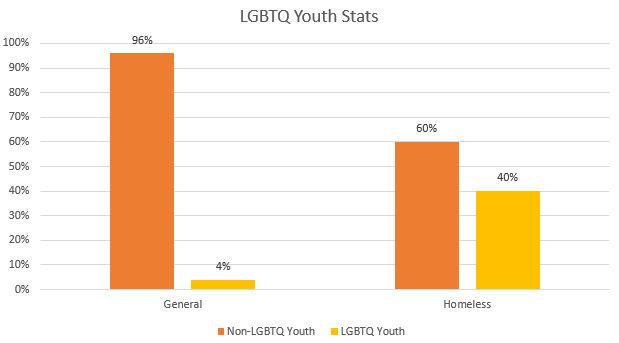Almost 40% of homeless youth identify as LGBTQ. Of those, 46% ran away from home because of family rejection. They are 7.4x more likely to experience acts of sexual violence than their heterosexual peers and 3-7x more likely to engage in survival sex to meet basic needs such as shelter, food, medications, and toiletries.
Why?
Growing up LGBTQ means several things. The biggest is not always having familial support. After coming out, LGBTQ youth run the risk of getting kicked out of the home, facing rejection, discrimination, and physical violence from family members. Although LGBTQ activists have made incredible progress in marriage equality, work and housing protections, and gender neutral bathroom laws (in certain states) – many obstacles remain. As LGBTQ youth continue to face rejection from their immediate family members, they run an increasingly high rate of experiencing homelessness, which also makes them susceptible to sex trafficking.

Florida ranks third in the country for sex trafficking cases. Transgender and gay male youth are especially at risk. While there are many homeless services available in the Tampa Bay area, youth using adult homeless shelters are more likely to experience molestation and further victimization.
LGBT youth may not utilize available services for fear they will be mistreated or that their providers won’t be LGBTQ friendly. They may also fear repercussions if they reach out – being torn away from “chosen” family or friends. Many have had unfavorable experiences with authorities, including cops, lawyers, and even social workers. Some of them may not even know services exist to help them.
If you do serve LGBTQ youth and are having trouble determining if they are in a trafficking situation, pay close attention to their nonverbal cues and answers to questions. Many learn from a young age how to hide pieces of themselves to survive. Find out if their movements/communications are monitored or if their money is being restricted by a non-parent or guardian. Ask them if they frequently move or if they have loved ones that could be threatened with arrest or deportation if they speak out.
How can we help?
GLS offers pro bono legal services for trafficking victims and is an LGBTQ friendly office. Since March, GLS has worked with 31 trafficking victims. For legal help regarding sex trafficking or family law issues, have them fill out an assessment form on our website or talk to us in person at our offices in St. Pete or Bradenton. For additional services, refer them to the resources listed below. Encourage survivors to tell their stories. Help ensure LGBTQ youth are aware of the services available to them.
Are you part of a nonprofit? Make your organization a visible supporter of the queer community by marking your website and building as LGBTQ friendly – hanging the rainbow flag or “Hate Free Zone” signage, or even simply stating on your website that you welcome LGBTQ community members. Beyond being visibly supportive, hire diverse staff, including LGBTQ individuals from different backgrounds. Attend Pride events. In passing conversations, don’t let homophobic remarks go unquestioned.
With anti-LGBTQ legislation passing through the senate and house and hate crimes increasing across the nation, it’s important for nonprofits and community members to show their support and tolerance.
For more information or to read more, check out the organizations highlighted below.
Resources:
Equality Florida
Project NoLabels
Come out St. Pete
ALSO Youth
LGBT Fund of SW FL
PFLAG
Out of the Closet
LGBT Resource Center – Gulfport
Statistics:
The Polaris Project